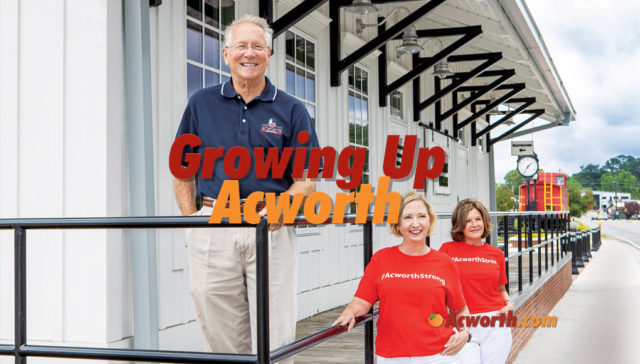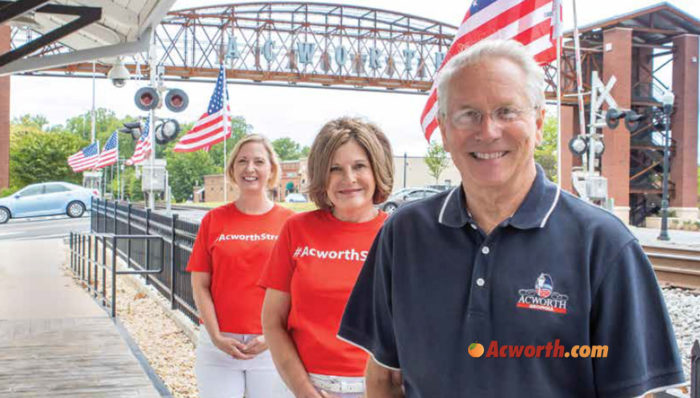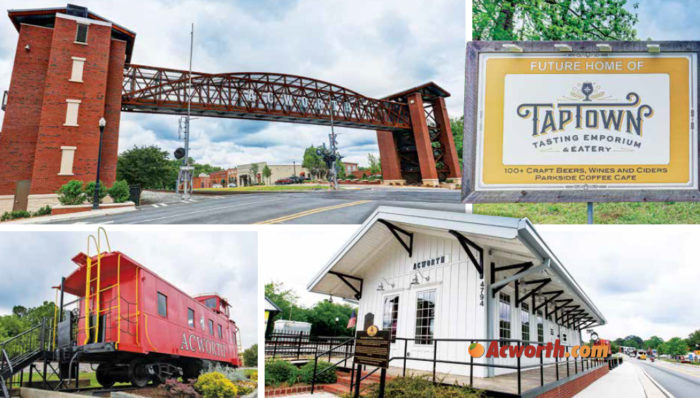With a revitalization of downtown and rethinking of land use, Acworth is experiencing growth in the business, restaurant, and craft beer landscapes.
For the last several years, the development taking place in Acworth has been intentional and by design. Mayor Tommy Allegood, the Acworth Board of Aldermen, and the city’s staff had a clear vision of creating connectivity and extending the town’s existing downtown area toward Logan Farm Park. The purpose is to allow for more development and private investment; a newer downtown already is taking shape. New infrastructure includes a pedestrian overpass, Depot Park History Center, new public parking areas, redeveloped roads to create better traffic flow, and a roundabout.
Kim Watt, tourism director and assistant director, Acworth Parks, Recreation and Community Resource Department, says Acworth’s city website visits have increased an average of 30 percent each year. “When speaking to many of our local businesses, their clientele continues to grow from areas that have heard about Acworth through marketing, events held, or simple word of mouth,” Watt says. “Acworth has become a dining destination over the years, with multiple chef-driven restaurants within our community. Lake Acworth is also a huge tourist draw as the lake is restricted to non-motorized boating. It makes it the perfect location for kayaks, canoes, and stand-up paddleboards.”
Depot Park History Center opened in the fall of 2019 and is a free, digital history center that provides information rich in Acworth history. Visitors can hear oral stories from many long-time residents.
A clear game changer has been the flurry of restaurants that continues to make Acworth a dining destination. Watt says foodies are always looking for a new and different experience, and Acworth brings in restaurants that satisfy those requests. Along with the onslaught of new restaurants are new businesses affiliated with the craft beer movement.
“Many people choose a community to visit based on what breweries and tap rooms they can explore, along with restaurants,” Watt says. “We’re excited about the addition of two new businesses coming to Acworth to fulfill this niche, 1885, Red Top Brewhouse, and TapTown.”
Revitalization
Acworth’s redevelopment of its downtown area began in the late-1990s, when a plan and focus on the revitalization of the Historic Downtown Commercial Business District was created. “Over the next 20 years, city leadership invested millions of dollars, primarily through SPLOST, in infrastructure, streetscape, and parking in the Historic Downtown,” said Jeff Chase, city of Acworth downtown development director. “Following the successful revitalization of Historic Downtown, the focus has turned to the city’s new Parkside District. The completion of the 14-acre Logan Farm Park Expansion and the 44,000-square-foot Acworth Community Center has made Parkside a desirable location for new businesses. A [new] mixed-use development will include office, retail, and residential space.”
Acworth’s city team has implemented a vision to revitalize the downtown area to attract business investment and tourism through improvements to Main Street, Cherokee Street, Dallas Street, Academy Street, Carnes Street, Senator Russell Avenue, Southside, School Street, and Taylor Street.
“The city has attracted many businesses, restaurants, and new residential developments by building 500 parking places, preserving 140 acres of dedicated greenspace parks, implementing silent railroad crossings, and connecting our downtown with a pedestrian bridge over our railroad,” says Alex Almodóvar, assistant to the city manager. “In 2016, the city opened the expanded Logan Farm Park on Cherokee Street with walking trails, 140 acres of contiguous green space, a picnic shelter, and a huge playground. Since September 2017, the city has completed the next phases of the downtown redevelopment.”
Those next phases include the realignment of Lemon Street, a new left-turn lane on Main Street at Lemon, a four-story pedestrian overpass over the railroad tracks, construction of a new public parking lot, conversion of the small public parking lot at Main and Lemon into a park with a replica train depot/history center, renovation of a historic house into an Arts Center, and construction of the new Community Center. The public investment committed by the city of Acworth is helping spur private investment as well.
“This 15-year journey is the city’s vision to build a great quality of life through the transformation, redevelopment, and extraordinary expansion of our downtown historic district,” Almodóvar says.
Acworth has three distinct business districts, each with its own growth and evolution patterns. The districts are located at the two Interstate 75 exits to the city, located in the downtown historic district and the Cobb Parkway/Highway 41 commercial shopping/dining district.
The Interstate 75 district has many opportunities for mixed-use residential, business, and hotel redevelopment. The downtown historic business district will continue to attract new business and growth, because of neighborhood-friendly restaurants and boutique shopping. The Cobb Parkway/Highway 41 district is a four-mile shopping/dining corridor that has attracted national retailers. Opportunities for commercial growth, health services, and corporate home locations are plentiful.
“The quality of life that Acworth offers through our schools, churches, volunteer and recreational opportunities, combined with the public investment and business friendly attitude, makes Acworth very welcoming to new businesses as well as those businesses who might be looking to relocate,” says Chase. “Downtown Acworth offers a feeling of community and sense of place that many people are looking for today. Walkability and a variety of shops and restaurants create an unique atmosphere that is hard to replicate at strip malls and stand-alone stores or restaurants.”
Almodóvar says Acworth has always been a recruiter and viable partner for economic development. The economic development team is comprised of representatives from Community Development; Parks, Recreation and Community Resources; and Power and Public Works. “This team has the expansive perspective, experience, and track record in attracting and recruiting new businesses and investments into the community,” he says. “We own our own power utility – Acworth Power – and have a partnership with the Electric Cities of Georgia and their Location Georgia division. The economic development team also works hard to create and maintain relationships with other neighboring resources at local and state levels.”
Funding
Chase says Acworth has used many successful funding mechanisms over the years to bring redevelopment to downtown. In 2007, investors purchased and renovated a 10,000-square-foot building adjacent to the two-block Historic District that once housed a grocery store. “The building had no historic significance and was in bad shape,” Chase says. “They invested more than $2 million dollars toward acquisition and rehabilitation, and were able to accomplish this through the assistance of the Acworth Downtown Development Authority acting as a mechanism to apply for and receive loan funds through the Georgia Department of Community Affairs Downtown Development Revolving Loan Fund and the Georgia Cities Revolving Loan Fund.”
The two, $250,000, low-interest loans gave a tremendous boost to the efforts of those local businessmen. Today, the building houses Lacey Drug Co. and the Emory Physicians Group.
Acworth evaluates the needs of each opportunity individually and will work with each prospect individually, says Almodóvar. “Incentives may be offered that can range from discounted permitting costs and specialized power rates to discounted business license fees or other unique possibilities,” he says. “The economic development team also will work to pair the prospective business with any local, state and/or federal programs.”
Open for Business
“My partners and I chose Acworth to open TapTown because of the economic potential created by the revitalization efforts and vision from Mayor Tommy Allegood and the city council,” says Bill Dunk, owner of TapTown Taste Emporium and Eatery, a fast-casual restaurant concept with more than 100 self-pour craft beers, wines, ciders, champagnes, and craft sodas. Set to open in early-2021, TapTown also will have a two-story coffee cafe overlooking Logan Farm Park. “We wanted to open our first TapTown in a city that promotes community, and Acworth certainly fits that bill.”
It is important that business owners and entrepreneurs invest in the growth and development of Acworth. “It starts with the local government,” says Rob Hankinson, owner of Red Top Brewhouse, a two-story brewhouse and separate brewery with an attended bar, two automated beer walls, and high-end pub grub and specialty dishes. “Other cities we looked at had limited to no interest in a brew pub or brewery. While some city governments remain skeptical about new ventures, Acworth actively promotes and offers continued support for those willing to invest in their city. It makes life so much easier when you have their full support.”
A Bright Future
With a unique and historic downtown, two lakes, four beaches, and a large number of trails and amount of greenspace, Acworth is a destination for anyone interested in outdoor activities, capped off with a great meal and delicious craft brew.
“I feel that the city of Acworth will have a large growth spurt in the next three to five years, and this growth will significantly impact the local businesses and community,” says Dunk. “Acworth will become a destination city that people don’t drive through to get somewhere else; they will drive to Acworth to be somewhere.”
“The Acworth redevelopment story is about a city that has become the most dynamic growth story in the region,” he says. “Our vision for the future is filled with quality growth, employment opportunities, housing diversity, and recreational and cultural experiences.”













